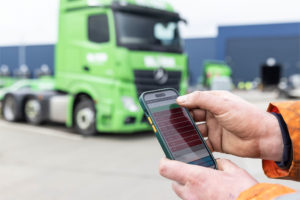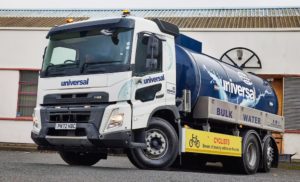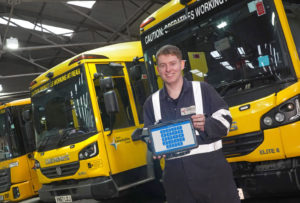
Such systems can provide important insights, from operating costs to individual vehicle performance and recurring defects, as well as parts and labour costs.
Wren Kitchens, based in Barton-upon-Humber, North Lincolnshire, which operates a fleet of 351 trucks and 144 trailers nationwide, has been using Truckfile since 2021.
Drivers now use the Truckfile Driver app on their smartphones or a tablet device to complete their walk-around checks each morning, and any faults can be logged quickly and easily, backed up with photographs or video.
Using Truckfile has helped the firm to achieve Earned Recognition status, which it attained within three months of installing the system.
In 2021, for the first two weeks of March the company had 17 defects reported. By 2022, with its drivers using Truckfile, it had 360 issues identified in the same period. This year the corresponding time window has seen more than 700 deficiencies flagged up.
Lee Thompson-Halls, National Fleet Manager, said: “To be clear, that’s not because more is going wrong with our vehicles, it’s because Truckfile has helped us tighten the net so that flaws are not slipping through unnoticed.
“Using the app is simpler for the drivers and means there are no paper forms to get lost.
“The system makes it very easy to confirm that all drivers have completed their checks, and also records the time spent and location, so we know they’ve taken at least the stipulated 12 minutes to go through the process and done so before leaving the yard.”
Universal Tankers, the vacuum tanker operator based in Stockton-on-Tees, which specialises in waste-water removal and water delivery, operates a fleet of 85 vehicles from 22 depots throughout England and Scotland – supported by a transport management system from Mandata.
The business began its transition from paper to a Mandata TMS computerised transport management system more than ten years ago, as it looked to streamline operations, driver workflow and communications, and accounts.
Then it was carrying out 50 jobs per day with ten trucks but now, the firm is doing more than 500 jobs per day, and has moved on to adopt even more sophisticated technology from Mandata.
Matthew Tanfield, Operations Director, said: “We’ve now moved on to using the Manifests app on handheld tablets, Mandata’s tracking systems with driver behaviour, as well as vehicle defect reports. This gives us full transparency, from planning the job through to invoicing.
“One of the main benefits is we’ve reduced time we spend on the phone to drivers. This is time we can spend elsewhere, whether it’s planning the next day or even looking for more work.”
Founded in 2020 by company director Craig Woodhead, Scunthorpe-based EFW Transport has a fleet of seven trucks involved in general haulage operations.
In the early stages, the business relied on an Excel spreadsheet and a job sheet to plan its work, but now uses the HaulTech transport system.

Phillip Wray, Operations Director, said: “It used to take us three days to invoice, now it takes us 30 minutes, we can essentially do invoicing with a push of a button.
“It’s mind-blowing, the system is worth it just for that reason alone in my opinion. HaulTech has freed up a lot of my time which is enabling me to build upon our customer base and continually grow the business.”
B&M’s transport team makes more than 100,000 deliveries to stores each year, using a fleet of 1,551 vehicles.
After introducing the R2C Online system, the full vehicle history file is always available digitally for compliance checks and the transport office is able to keep track of all service inspections, MOTs and defects in one central place.
In addition, fleet visibility has improved and efficiency has increased in B&M’s in-house workshop thanks to job progress reporting and safety defect data in real-time.
Steve Pearson, Fleet Manager, said: “All the necessary paperwork is saved online. If Driver and Vehicle Standards Agency were to visit, I can access details of the entire fleet at the click of a button.
“This supports us in running a fully compliant fleet and keeping our Operator Compliance Risk Score (OCRS) in the green.
“We really like that we can see if work is in progress or completed. And because I can see which defects apply to which vehicle I can assign the repair work with the most suitable technician.”
Meanwhile, North Lanarkshire Council has rolled-out a new system from Freeway Fleet Systems which sees workshop mechanics equipped with rugged tablet devices with a mobile app providing digital job cards and inspection sheets.
Its fleet of 600 includes refuse vehicles, buses, ride on grass cutting machinery, cars and vans that are used across departments such as waste, grounds maintenance, health and social care, roads and education.
The Council introduced Freeway in 2022 and with the help of Freeway’s software implementation specialists Genie Insights, data was transferred from the existing fleet management system and spreadsheets, with paper reports replaced with digital versions.
The council also has plans for its drivers to be able to record their walk-around vehicle safety checks using a Freeway app.

As the world becomes increasingly digitised, expect to see transport firms adopt increasingly sophisticated digital transport management systems as they look to cut costs and improve the efficiency of their organisations.








